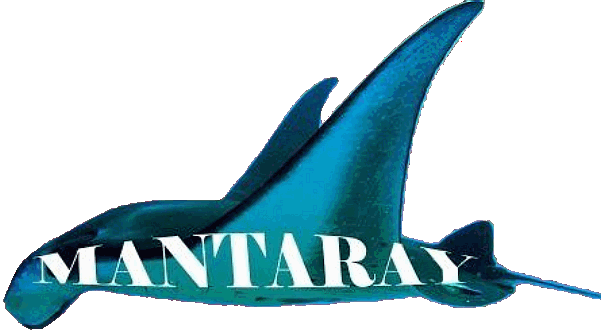|
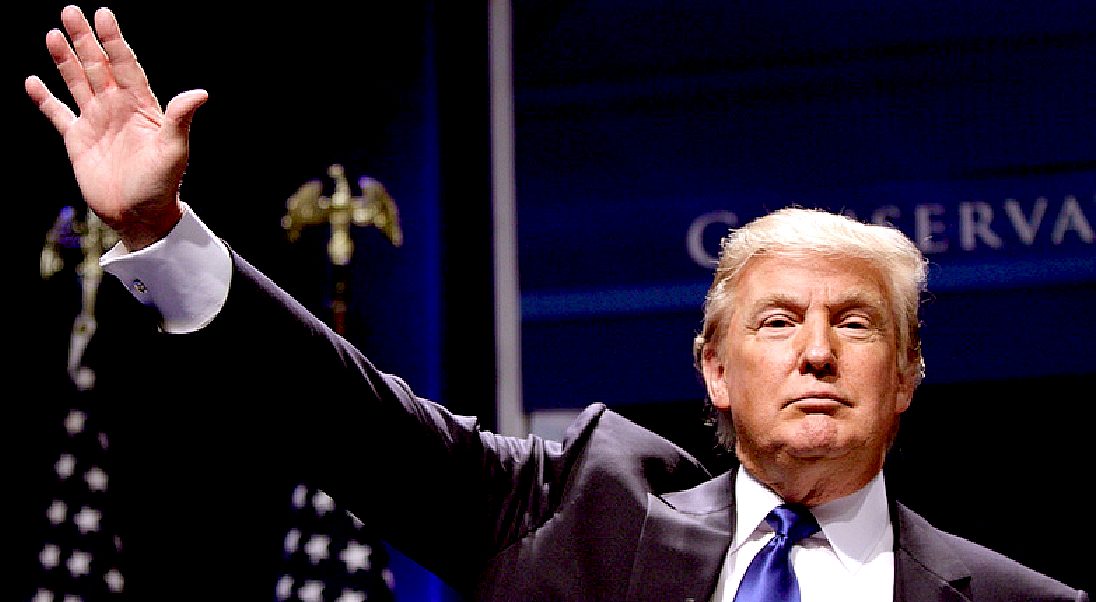
PRESIDENT
TRUMP - New York
(CNN)
President-elect Donald Trump conceded Tuesday there is "some connectivity" between human activity and climate change and wavered on whether he would pull the United States out of international accords aimed at combating the phenomenon, which scientists overwhelmingly agree is caused by
human activity.
As such this maverick entrepreneur, turned statesman, represents a risk to
world stability and sustainability. We live in hope and would support the
President elect where in taking the oath of office that his empire
building successes will lead him to the ultimate conclusion, that we all
inhabit planet
earth and should all work together to achieve a truly circular economy
and build relations with our cousins to that end.
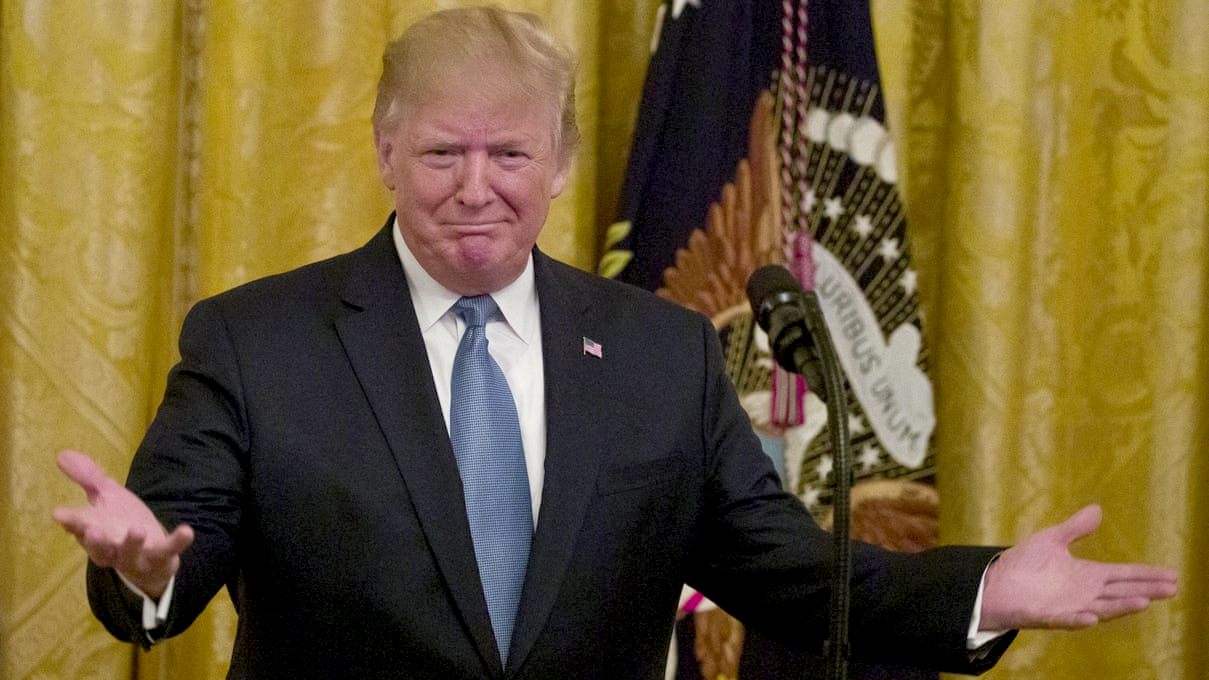
THE GUARDIAN JULY 8 2019 -
Listed five of the biggest environmental setbacks under Trump. They read
to us like a shopping list of ways to warm the planet, where
desertification is killing thousands of people in direct proportion to
the excesses of developed nations:
1) Departure from the Paris climate agreement
In June 2017, less than five months after his inauguration, Trump announced his plan to pull the US out of the Paris climate agreement. He told an audience outside the White House: “I was elected to represent the citizens of Pittsburgh, not Paris”. He claimed the agreement, signed by the US and nearly 200 countries in 2015, promising to cut greenhouse gas emissions to keep global heating below 2C, unfairly disadvantaged the US and negatively impacted jobs and factories.
2) Shrinking national monuments and animal protections
Trump attracted broad criticism in December 2017 when he announced plans to slash the size of two national monuments in Utah. Bears Ears was cut from 1.5m acres to 228,784 acres and Grand Staircase-Escalante almost halved from approximately 2m acres to 1,006,341 acres – marking the biggest elimination of public lands protection in America’s history. In August 2018 officials announced plans to allow more mining on the land and to sell some of it off – despite previously vowing not to. The following month, the administration announced plans to remove key provisions from the Endangered Species Act – prompting conservationists to warn it could put vulnerable plant and animal species in more danger.
3) Rollback of the Clean Power Plan
The Environmental Protection Agency is in the process of finalizing plans to dismantle the Clean Power Plan, an Obama-era rule intended to cut emissions from power plants and encourage them to move towards natural gas and renewable power. The regulations, which were announced in 2015 and had the backing of hundreds of businesses, were billed at the time as the “biggest step that any single president has made to curb the carbon pollution that is fueling climate change”.
4) Cuts to clean water protections
The Trump administration plans to remove protections from thousands of America’s streams and millions of acres of wetlands, which is feared will harm wildlife and enable pollution to enter drinking water. Under the proposal, fewer waterways would require permits to pollute – including agricultural runoff and industry waste. Currently, protected waterways provide drinking water to approximately 117 million people.
5) More methane
In September 2018, the Trump administration announced its plans to repeal rules that aim to restrict methane leaks on public and tribal lands. The Obama administration tried to cut leaks by forcing oil and gas companies to capture methane (a key gas involved in
global
heating), update technology and arrange to monitor leaked gas. But the Department of the Interior has branded the rule “flawed” and “unnecessarily burdensome on the private sector”.
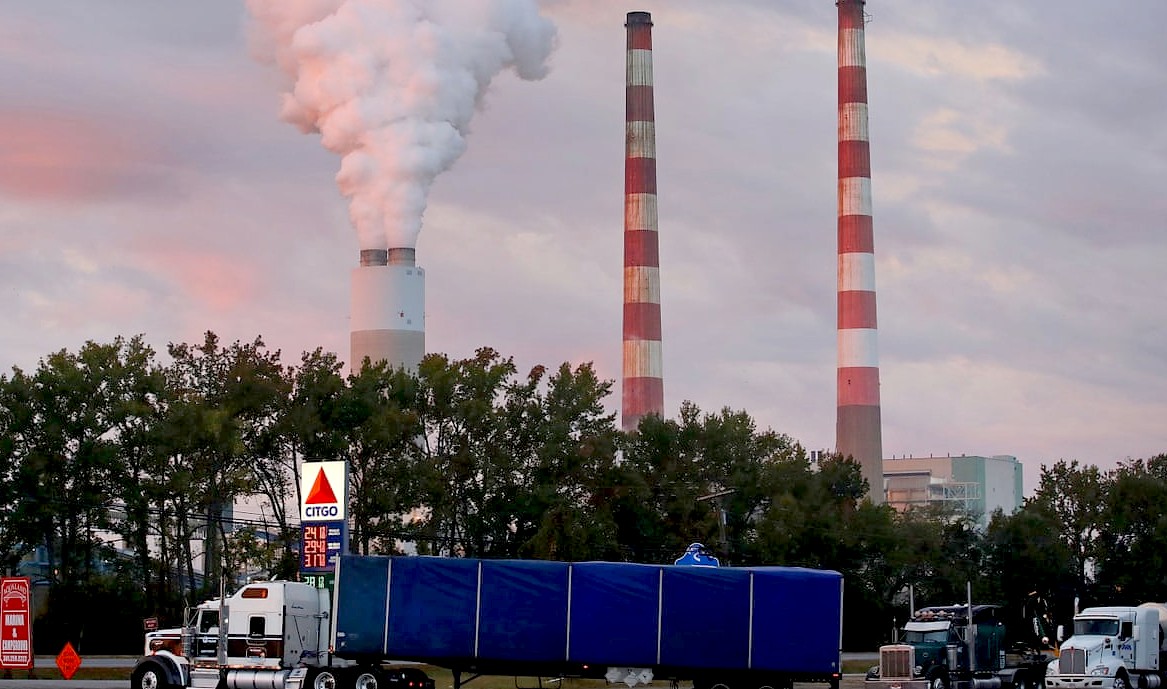
Donald John Trump (born June 14, 1946) is an American businessman, former
television personality, politician, and the President-elect of the
United States. He
was scheduled to take office as the 45th President on January 20, 2017. He
is a climate change denier, hence what is commonly called a climate
criminal. Well, what do you expect from a billionaire who is looking to
make yet more money from milking the US economy, no matter what the cost to
his fellow men and women. Shame on you Mr President. Is this going to be
your legacy?
The President elect was born and raised in Queens, New York City, Trump received an economics degree from the Wharton School of the University of Pennsylvania in 1968. In 1971, he took charge of his family's real estate and construction firm, Elizabeth Trump & Son, which was later renamed The Trump Organization. During his business career, Trump has built, renovated, and managed numerous office towers, hotels, casinos, and
golf courses. He owned the Miss USA and
Miss Universe
pageants from 1996 to 2015, and has lent the use of his name in the branding of various products. From 2004 to 2015, he hosted The Apprentice, a reality television show on NBC. As of 2016,
Forbes listed him as the 324th wealthiest person in the world (113th in the United States), with a net worth of $4.5
billion.
Trump sought the Reform Party's presidential nomination in 2000, but withdrew before voting began. He considered running as a Republican for the 2012 election, but ultimately decided against it. In June 2015, he announced his candidacy for the 2016 election, and quickly emerged as the front-runner among 17 contenders in the Republican primaries. His final opponents suspended their campaigns in May 2016, and in July he was formally nominated at the Republican Convention along with Mike Pence as his running mate. His campaign received unprecedented
media coverage and international attention. Many of his statements in interviews, on social media, and at campaign rallies were controversial.
Trump won the general election on November 8, 2016, against Democratic rival Hillary
Clinton. At age 70, he will become the oldest and wealthiest person to assume the presidency, the first without prior military or governmental service, and the fifth elected with less than a plurality of the national popular vote. 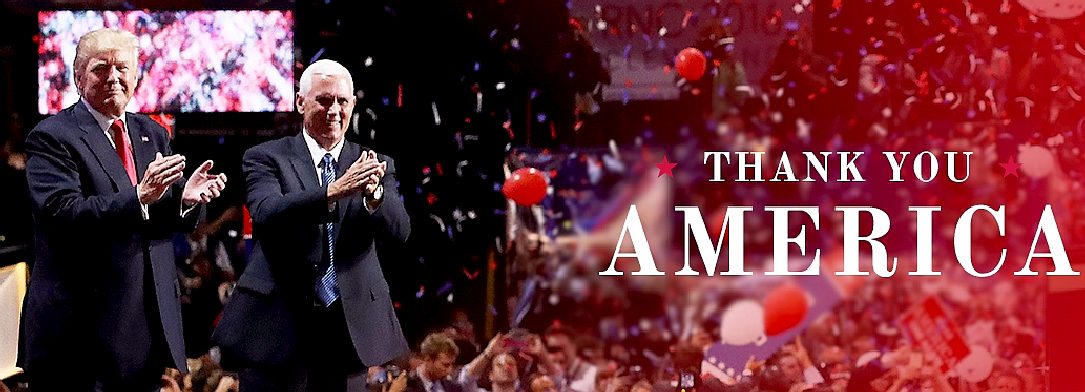
THANK
YOU AMERICA - This
is the message that President Trump sent out to America following his
election success: "We showed America the silent majority is no longer silent. Today, we created an America that WINS again. Today, we made our hopes, our dreams – our limitless potential – a reality. Today, we made history. Today, we created a government that is once again of, by and for the people.
Thank you, America. I will not let you down. I will always be your voice. I will always be your champion. Now it’s time to get to work – to unite, to prosper, to become stronger. Together, I have no doubt we have taken the first step to Make
America Great Again!"
Our
thoughts are that the USA is already a great country, and provided that their
standing in the world is not compromised, the country will always be great
and does not need to be any greater than it already is, but rather the
challenge is to maintain the status quo. The country needs temperant governance
and understanding of the problems facing the world today, such as plastic
pollution
and potential food
shortages that threaten to destabilize a world that is for the most part
peaceful.
Trump's platform emphasizes renegotiating U.S. – China relations and free trade agreements such as NAFTA and the Trans-Pacific Partnership, strongly enforcing immigration laws, and building a new wall along the
U.S. – Mexico border. His other positions include pursuing
energy independence while opposing
climate change regulations such as the Clean Power Plan and the
Paris Agreement, reforming veterans' affairs, repealing the Affordable Care Act, abolishing Common Core education standards, investing in infrastructure, simplifying the Internal Revenue Code (tax code) while reducing taxes across the board, and imposing tariffs on imports by companies
off-shoring jobs. He advocates a largely non-interventionist approach to foreign policy while increasing military spending, "extreme vetting" of Muslim immigrants to preempt domestic Islamic
terrorism, and aggressive military action against ISIS. His positions have been described by scholars and commentators as populist, protectionist, and
nationalist.
THE
TELEGRAPH 17 JAN 2017 Ten weeks after stunning America and the world by winning the US election, Donald Trump will be sworn in as the 45th President of the United States.
He will replace Barack Obama in the White House, but not before a ceremony that dates back to George Washington.
The eyes of the world will be on Mr Trump as he takes the Oath of Office, and offers his inaugural address. Why is there a gap between US election and presidential inauguration?
The US election was held on November 8 2016, but Donald Trump does not officially become president until midday on January 20.
Until 1933, the new president was inaugurated on March 4, four months after election day.
This was then shortened to around two months with the ratification of the 20th Amendment.
The time between US election and inauguration allows for the incumbent, or 'lame
duck', president to tie up any loose ends, and for the incoming president to prepare for his tenure by working on policy and appointing his cabinet.
But the main reason for the delay is to allow for the election to continue. On November 8, members of the public cast their votes – but not directly for who they want to be president. Americans vote for people called 'electors' in their state who are supporting the candidate they want to become president – this process is called the 'Electoral
College'.
The more people who live in a state, the more electors there are for that state. The candidate with the most electors wins all the state's electoral college votes and the first candidate to win enough states to get to 270 electoral votes is elected to that office.
Mr Trump was declared officially the president-elect when the Texas votes were counted, pushing him over the 270-vote threshold.
After the December 19 vote, Mr Trump finished with 304 electoral votes and his Democrat opponent Hillary Clinton got 227. Seven electors defied convention and went against the popular vote, refusing to vote for either candidate.
The results from December 19 were confirmed by Congress on January 6. 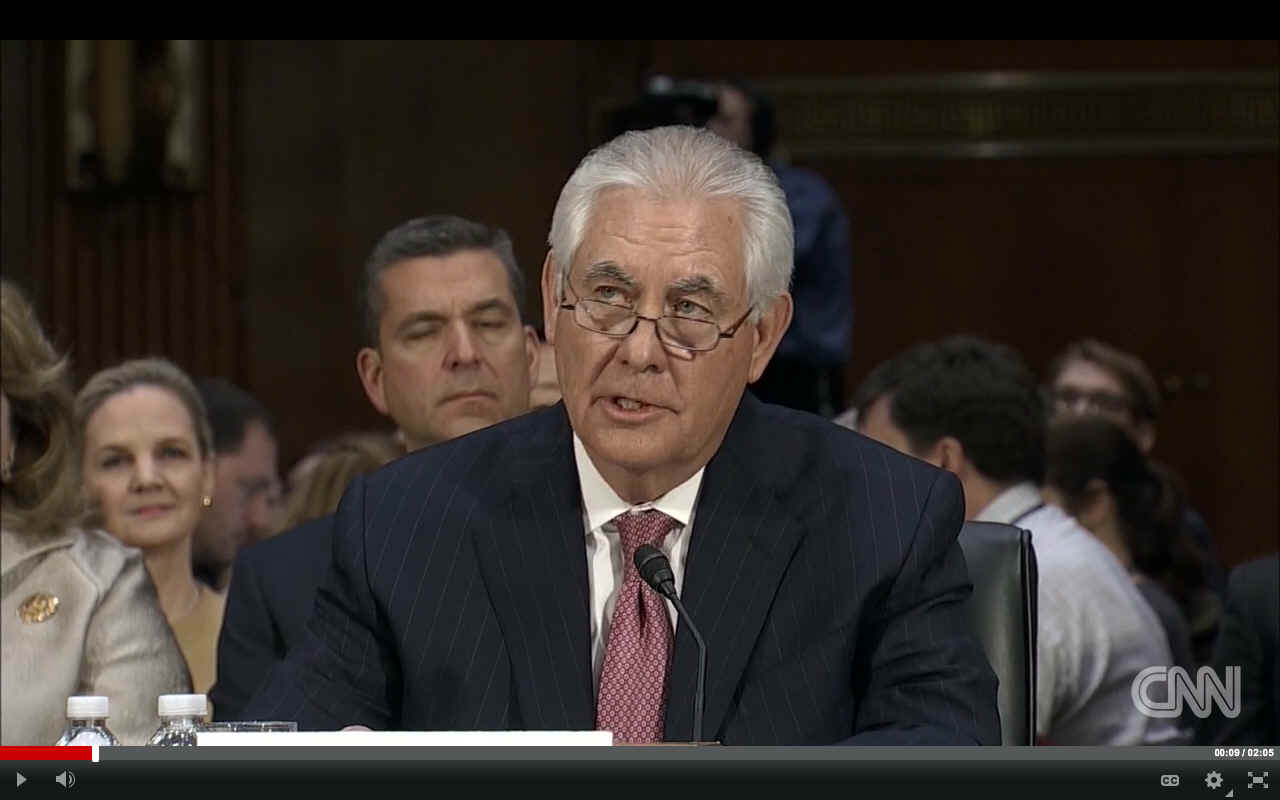
REX
TILLERSON - Hong Kong
(CNN) Chinese state media has taken aim at Rex Tillerson, President-elect Donald Trump's pick for secretary of state, after he suggested a more aggressive strategy toward Beijing in the contested waters of the South China Sea.
In his confirmation hearing Wednesday, Tillerson, the former CEO of oil giant
ExxonMobil, said that China should be denied access to the islands it has built.
The Global Times, a provocative but state-sanctioned tabloid, said that "unless Washington plans to wage a large-scale war in the South China Sea, any other approaches to prevent Chinese access to the islands will be foolish."
"Tillerson had better bone up on nuclear power strategies if he wants to force a big nuclear power to withdraw from its own territories," the unbylined opinion piece said on the paper's English-language site.
It concluded that Tillerson's statements were "far from professional."
"If Trump's diplomatic team shapes future Sino-US ties as it is doing now, the two sides had better prepare for a military clash."
The paper is published by the People's Daily -- the ruling Communist Party's mouthpiece. It's known for its hawkish and colorfully-worded editorials but analysts say it doesn't necessarily reflect Chinese policy.
The English-language China Daily took a similar stance but questioned whether Tillerson's views would translate into US foreign policy.
"Such remarks are not worth taking seriously because they are a mish-mash of naivety, shortsightedness, worn-out prejudices, and unrealistic political fantasies. Should he act on them in the real world, it would be disastrous," it said.
"What happened on Wednesday shows that if and when confirmed, Rex Tillerson needs to first acquaint himself with the ABCs of China-US relations and diplomacy at large."
Eve of the inauguration
President-elect Donald Trump and vice-president elect Mike Pence will lay a wreath at Arlington National Cemetery on January 19. This will be followed by a "Make America Great Again!" welcome concert at the Lincoln Memorial. The Oath of Office
At noon local time (5pm GMT) on January 20, Donald Trump will take the Oath of Office and be sworn in as America’s 45th president.
Chief Justice John Roberts of the US Supreme Court will administer the oath on the steps of the United States Capitol Building. It will go something like this:
"I Donald J Trump, do solemnly swear that I will faithfully execute the Office of President of the United States, and will to the best of my ability, preserve, protect and defend the Constitution of the United States, so help me God.!
Mike Pence, the vice president-elect, will take the oath shortly before Mr Trump. The inaugural address
After the swearing in, Mr Trump will give a speech that will, as all inaugural addresses are, be recorded in the pages of history.
In his second inaugural address, with the country emerging from devastating civil war,
Abraham Lincoln proclaimed “malice toward none and charity for all”. Franklin Roosevelt told a country ravaged by the Great Depression that all it had to fear was fear itself, and
John F Kennedy urged Americans to
“ask not what your country can do for you - ask what you can do for your country.”
Mr Trump will hope to follow in their footsteps. If he follows Mr Obama’s example, the speech will be about 20 minutes in length. 
MUTUAL RESPECT
- The official response to Tillerson, and Trump's attacks on China, by China's Ministry of Foreign Affairs
(MOFA) has been more muted than the fiery rhetoric in China's press.
Since winning the election Trump has lashed out at China on Twitter, made clear he's serious about wringing a new trade deal from Beijing and upended US policy toward Taiwan -- an issue of deep sensitivity for China.
Lu Kang, the ministry's spokesman, said Thursday MOFA had read the entire transcript of Tillerson's remarks. He said that the situation in the South China Sea had "cooled down" and should be resolved by the claimants in the region.
"If you look at what has happened since President Xi's conversation with President-elect Trump, the Trump team has mentioned mutual respect between China and the US in its press releases. We agree with the notion that two countries should develop their relations based on mutual respect," he said.
Under the Obama administration, the US has repeatedly called for freedom of navigation in the South China Sea and sailed and flown its assets near the islands China controls -- drawing repeated warnings from China.
China has reclaimed more than 3,000 acres of land in the Spratly Islands since 2014, turning reefs and sandbars into islands equipped with airfields, ports and weapons.
Trump's pick for Secretary of Defense, retired Gen. James Mattis, in his confirmation hearing Thursday didn't depart from current US policy in the South China Sea.
"The bottom line is, sir, the international waters are international waters," he said, adding that the US needs to ensure that freedom of
navigation.
Does the outgoing president attend the inauguration?
It is customary for the outgoing president to attend the inauguration of the incoming president, however, it is not compulsory.
President Obama is expected to be there at Donald Trump's inauguration on Friday, but if he does not, then he would be the first president for 96 years to make such a snub.
The pair have had a strained relationship. During the election campaign, Mr Obama was born outside the US and was therefore not a legitimate president, and later suggested he was the "founder of Isis", but later backed down on both claims.
During the election campaign, Mr Trump said one of his first actions would be to try and erase the effects of Mr Obama's presidency.
He promised to cancel every "executive action, memorandum and order issued by President Obama", but again, he has backed down or softened his stance on several of Obama's policies.
On the campaign trail he repeatedly described Obama as weak, "a disaster," ineffective and
"the most ignorant president in our history.”
Mr Obama savaged him throughout the election campaign as irresponsible and dangerous, warning that the
"fate of the
world" was at risk in the event of a Trump presidency. However, at their meeting after the US election, both men struck a conciliatory note after they met to discuss the transition from one administration to the next. The pomp and circumstance
Prior to Mr Trump’s address there will probably be musical performances and words from religious leaders.
Afterwards, there will be a departure ceremony for Mr Obama as his family.
Mr Trump will then attend the traditional Congressional luncheon and take part in the inaugural parade.
His motorcade will travel down Pennsylvania Avenue from the Capitol to the White
House, with well wishers and protesters lining the streets. The White House handover Barack Obama will wake up in the White House on the morning of January 20. That night, Donald Trump will go to sleep for the first time in his new home.
The White House changes hands almost as instantaneously as the presidency does. While the inaugural ceremonies are underway, staff at the White House will be frantically moving out the remnants of the Obama administration, and preparing the residence and offices for their new
inhabitants. The next morning, Mr Trump will walk from his new White House residence to the West Wing to attend to his duties as President of the United States. Inaugural balls Across Washington DC inaugural balls will be held to mark Mr Trump's ascent to the presidency. They will feature dancing and entertainment and appearances by President and First Lady Trump, and Vice President and Mrs. Pence. 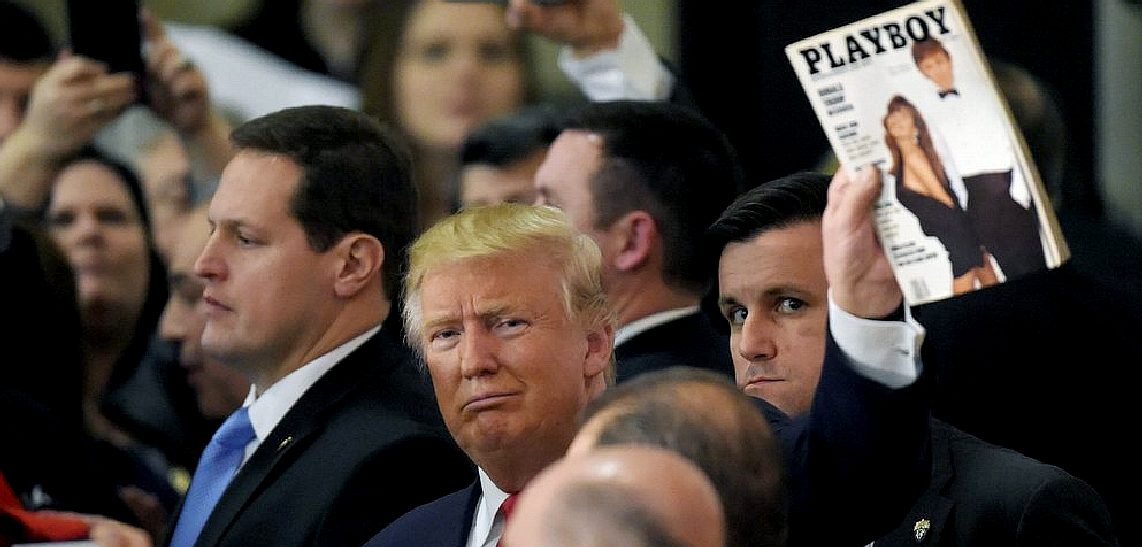
PLAYBOY
MAGAZINE - Trump holds up the March 1990 issue of Playboy with him on the cover as he works the rope line after a campaign rally in Farmington, New Hampshire.
Original photograph: Gretchen Ertl/Reuters.
The entertainment
Trump is struggling to find big name stars to appear at the festivities next month, according to
Hollywood insiders. At the moment only a few acts have agreed to turn up.
So who is performing at Trump's inauguration? The Radio City Rockettes
The high-kicking Rockettes, founded in 1932, performed at both inaugurations for
George W. Bush and will be involved in this inauguration.
The dance
troupe, which is famous for its synchronised high kicks, has been a New York City institution since the 1930s and is especially popular during the holiday season. However, some members of group have posted on social media that they have been forced by their bosses to perform.
Rockettes dancer Phoebe Purl posted on her Instagram (which has since been made private) that Trump is "not her president". Jackie Evancho
Evancho appeared on the fifth season of the reality TV contest show “America’s Got Talent.” A classical opera singer, she was just 11 years-old when she finished as runner-up on the show.
Since then, she has released five studio albums, including three Christmas albums, and performed for President Obama at the National
Christmas Tree
lighting ceremony and National Prayer Breakfast. The Mormon Tabernacle Choir
The Mormon Tabernacle Choir, comprised of 360 men and women who belong to the Church of Jesus Christ of Latter-day Saints, has performed at five previous inaugurations, according to a press release on the choir’s website. The last time came in 2001 during the inaugural parade for George W. Bush. They will perform at Trump’s swearing-in ceremony.
The choir is based in Salt Lake
City, where the Mormon church’s robust presence led many political analysts to suggest that Trump’s comments about women, feud with Mitt Romney and brash political style would struggle in the state.
However one singer, Jen Chamberlin, has resigned from the choir rather than perform at the inauguration 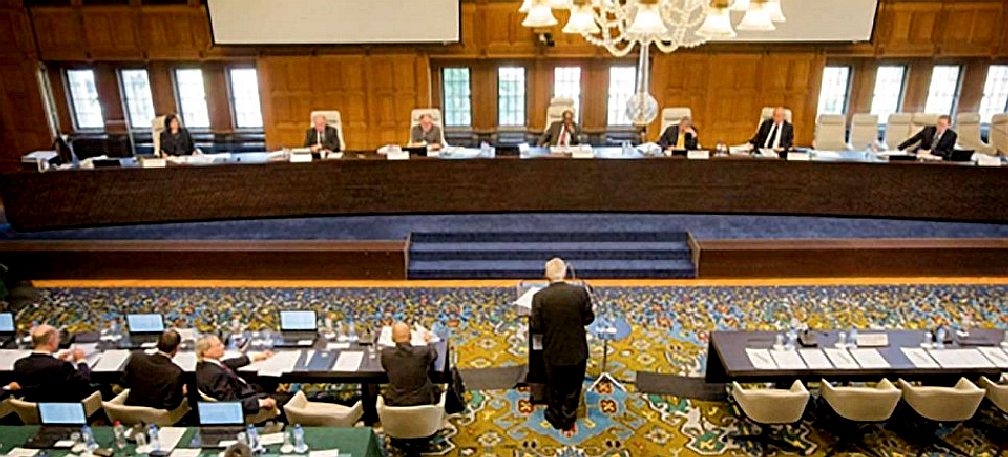
And those not performing are..? Kanye West
The controversial rapper surprised fans when he told concertgoers he would have voted for Trump in the election.
He later met with the president-elect at Trump Tower after being released from the hospital for a reported mental health crisis. Sir
Elton John Sir Elton's song “Tiny Dancer” was a fixture at many Trump rallies, so rumours began to circulate about him performing on Jan 10th.
However, his publicist issued a strong denial to the New York
Times. John had performed at a fundraiser for Trump’s opponent, Democrat Hillary Clinton, during the campaign. Andrea Bocelli
The Italian opera singer is a friend of Trump, but he will not sing at the inauguration.
Whether it was Bocelli or Trump who decided against it, however, is unclear. Bocelli reportedly decided not to do so over fears of a backlash. Frontman Gene Simmons will be touring in Europe at the time of the inauguration, but his wife said he would not perform anyway. Simmons, however, has expressed support for Trump in the past. Idina Menzel
Menzel, famous for her roles in the musical 'Wicked' and for singing Let it Go from 'Frozen,' told Vanity Fair that Trump’s scheduling woes were “karma” and that he might have to sing himself at the ceremony because “all the artists in the world got up and tried to get” Clinton elected. And the maybes... The Beach Boys
One of the most iconic bands in American musical history, The Beach Boys have been invited to perform by Trump, according to
Billboard. However, the band has not decided whether it will accept the invitation.
Kid Rock
The rock/rapper from Detroit has expressed support for Trump in the past, but there have been no reports yet that he will perform. Alec Baldwin Baldwin, the actor who has infuriated Donald Trump with his impersonation on the US comedy show Saturday Night Live, has offered to perform at the president-elect's inauguration next month.
No word yet from The Donald... The day after Washington National Cathedral will host a Presidential Inaugural Prayer Service on January 21. It is a tradition dating back to Franklin Delano Roosevelt’s first inauguration in 1933. Bill Clinton, however, chose the Metropolitan African Methodist Episcopal Church, the historic black church in downtown Washington, for both of his inaugural prayer services. 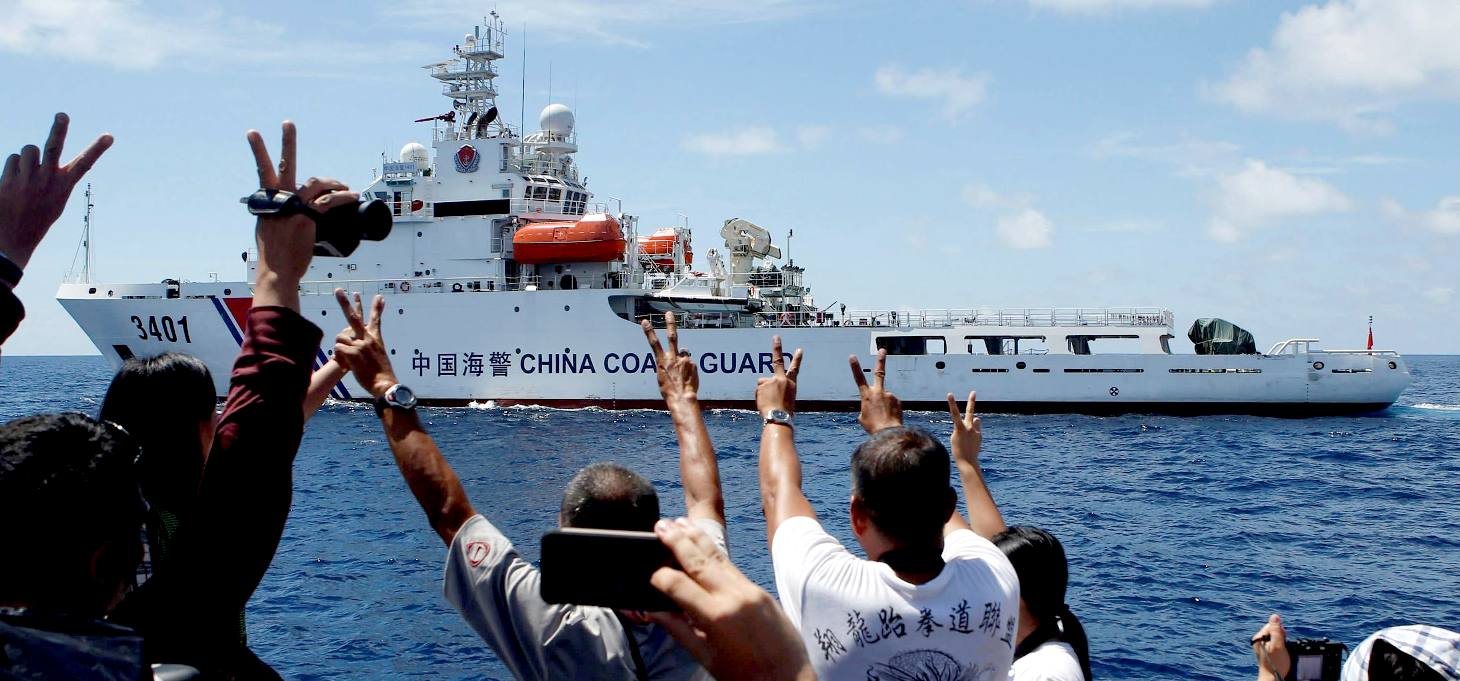
EXTREMLY WORRISOME
- Tillerson said Wednesday that China's activity in the South China Sea, which sees $5 trillion in shipborne trade a year, was "extremely worrisome."
He also compared China's territorial claims to Russia's military intervention and the annexing of Crimea in 2014.
"Building islands and then putting military assets on those islands is akin to Russia's taking of Crimea. Its taking of territory that others lay claim to," Tillerson said.
"We're going to have to send China a clear signal that first, the island-building stops, and second, your access to those islands also not going to be allowed."
Tillerson added that the Obama administration had neglected to tackle the problem, saying the "failure of a response has allowed them to just keep pushing the envelope on this
THE
GUARDIAN 17 FEB 2016 Yusef Salaam was 15 years old when Donald Trump demanded his
execution for a crime he did not commit.
Nearly three decades before the rambunctious billionaire began his run for president – before he called for a ban on Muslims entering the United States, for the expulsion of all undocumented migrants, before he branded Mexicans as “rapists” and was accused of mocking the disabled – Trump called for the reinstatement of the
death penalty in New York following a horrific rape case in which five teenagers were wrongly convicted.
The miscarriage of justice is widely remembered as a definitive moment in New York’s fractured race relations. But Trump’s intervention – he signed full-page newspaper advertisements implicitly calling for the boys to die – has been gradually overlooked as the businessman’s chances of winning the Republican nomination have rapidly increased. Now those involved in the case of the so-called Central Park Five and its aftermath say Trump’s rhetoric served as an unlikely precursor to a unique brand of divisive populism that has powered his rise to political prominence in 2016.
“He was the fire starter,” Salaam said of Trump, in his first extended interview since Trump announced his run for the White House. “Common citizens were being manipulated and swayed into believing that we were guilty.”
It was 1989. The crack epidemic had torn through New York as poverty soared to 25% and the city’s elites reaped the rewards of a booming
Wall
Street. The murder rate had risen to 1,896 killings a year; 3,254 rapes would be reported in the five boroughs, but only one captured the city’s extended attention and later exposed bias in its criminal justice system and media establishment.
On the evening of 19 April, as 28-year-old investment banker Trisha Meili, who was white, jogged across the northern, dilapidated section of Central Park, she was brutally attacked – bludgeoned with a rock, gagged,
tied and raped. She was left for dead but discovered hours later, unconscious and suffering from hypothermia and severe
brain damage. The New York police department believed they already had the culprits in custody.
That same night, a group of more than 30 youths had entered the park from East Harlem. Some engaged in a rampage of random criminality, hurling rocks at
cars, assaulting and mugging passersby. Among the group was Salaam, along with 14-year-olds Raymond Santana and Kevin Richardson, 15-year-old Antron McCray and 16-year-old Korey Wise. The teenagers – four African American and one Hispanic – would become known collectively as the Central Park Five.
They would all later deny any involvement in criminality that night, but as they were rounded up and interrogated by the police at length, they said, they were forced into confessing to the rape.
“I would hear them beating up Korey Wise in the next room,” recalled Salaam. “They would come and look at me and say: ‘You realise you’re next.’ The fear made me feel really like I was not going to be able to make it out.”
Four of the boys signed confessions and appeared on video without a lawyer, each arguing that while they had not been the individual to commit the rape they had witnessed one of the others do it, thereby implicating the entire group.
The city erupted. The case came to embody not only fears that accompanied the dramatic rise of violent crime in New York, but also its perceived racial dynamics. The case of a black woman, raped the same day in Brooklyn by two men who threw her from the roof of a four-story building, received little media attention. 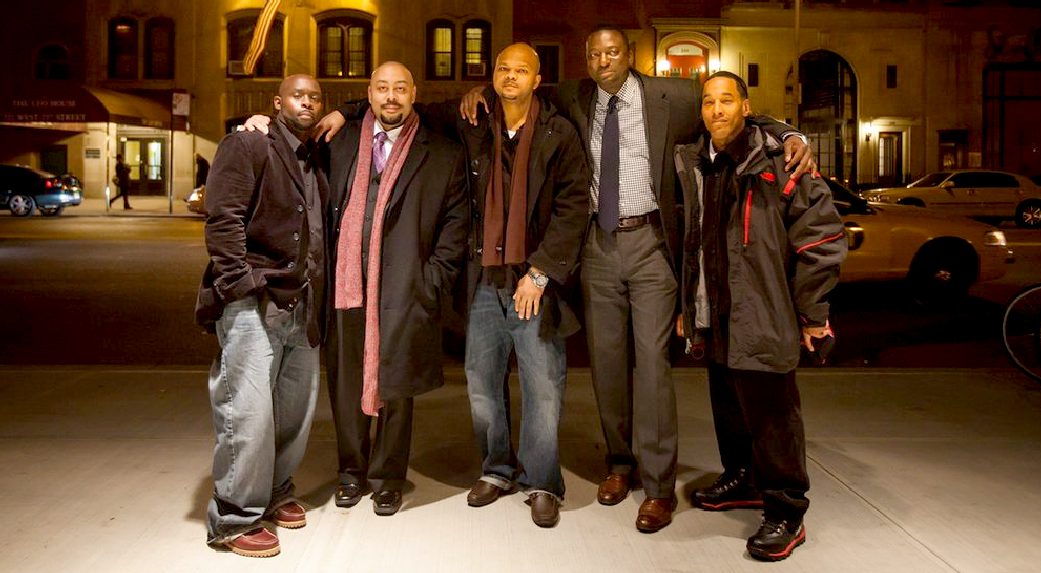
NEW
YORK TIMES - Antron McCray, Raymond Santana
Jr, Kevin Richardson, Yusef Salaam and Kharey Wise outside a theater before the New York premiere of the Central Park Five, in 2012.
Original photograph: Michael Nagle/New York Times / Redux / eyevine
He poisoned the minds of New York’
Just two weeks after the Central Park attack, before any of the boys had faced trial and while Meili remained critically ill in a coma, Donald Trump, whose office on Fifth Avenue commanded an exquisite view of the park’s opulent southern frontier, intervened.
He paid a reported $85,000 to take out advertising space in four of the city’s newspapers, including the New York Times. Under the headline “Bring Back The Death Penalty. Bring Back Our Police!” and above his signature, Trump wrote: “I want to hate these muggers and murderers. They should be forced to suffer and, when they kill, they should be executed for their crimes. They must serve as examples so that others will think long and hard before committing a crime or an act of violence.”
Salaam, now 41, cannot remember exactly where he was when he first saw the ads. He had no idea who Trump was. “I knew that this famous person calling for us to die was very serious,” he recalled.
“We were all afraid. Our families were afraid. Our loved ones were afraid. For us to walk around as if we had a target on our backs, that’s how things were.”
All five minors had already been paraded in front of the cameras and had their names and addresses published, but Salaam said he and his family received more death threats after the papers ran Trump’s full-page screed. On a daytime TV show two days later, a female audience member called for the boys to be castrated and echoed the calls for the death penalty if Meili died. Pat Buchanan, the former Republican White House aide, called for the oldest of the group, Wise, to be “tried, convicted and hanged in Central Park by June 1”.
“Had this been the 1950s, that sick type of justice that they wanted – somebody from that darker place of society would have most certainly came to our homes, dragged us from our beds and hung us from trees in Central Park. It would have been similar to what they did to Emmett Till,” Salaam said.
All five boys pleaded not guilty at trial the following year. The prosecution’s case rested almost entirely on the confessions they had given shortly after the incident. As would become crucial later on, there was no DNA evidence linking any of them to the crime scene and Meili, who made a miraculous recovery and testified in court, could not remember any details of the attack.
The jury found all five boys guilty. The court condemned them to prison to serve sentences ranging from five to 10 years and five to 15 years. Wise, who had remained in the city’s notorious Rikers Island jail, was sentenced as an adult.
Michael Warren, the veteran New York civil rights lawyer who would later come to represent the Central Park Five, is certain that Trump’s advertisements played a role in securing conviction.
“He poisoned the minds of many people who lived in New York and who, rightfully, had a natural affinity for the victim,” said Warren. “Notwithstanding the jurors’ assertions that they could be fair and impartial, some of them or their families, who naturally have influence, had to be affected by the inflammatory rhetoric in the ads.”
A spokeswoman for Trump’s campaign declined to comment. 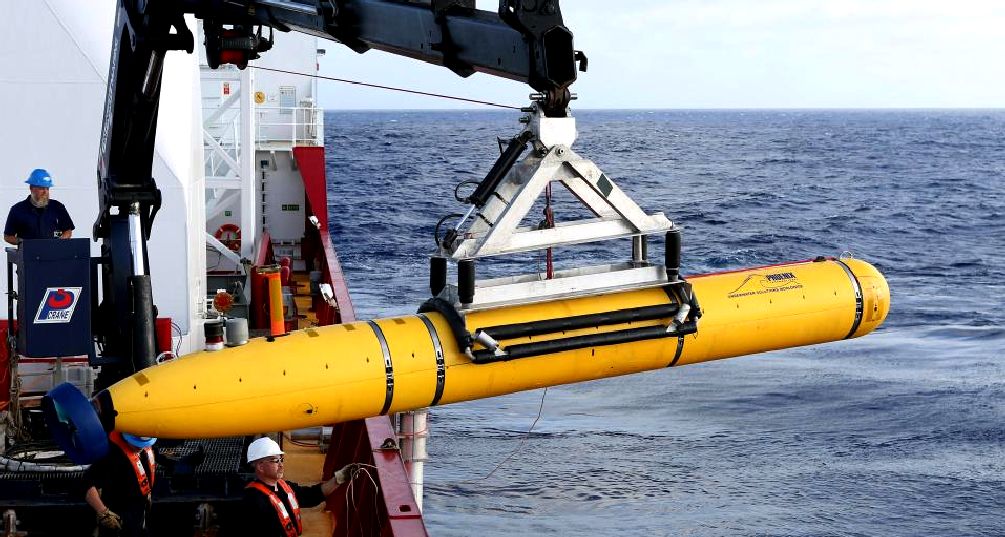
THE JAPAN TIMES - 15 JAN 2017
- Since last year’s surprising election of Donald Trump, Beijing has looked to up the stakes and increase its leverage in the disputed South China Sea. This past December, China seized a U.S. Navy unmanned underwater vehicle near the Philippines. The seizure was made outside of Beijing’s expansive and ambiguous “nine-dash line.” While the drone was eventually returned to Washington, the incident reveals a new level of mistrust and strategic rivalry between China and the United States. It has also further colored the water amid growing uncertainty on the future trajectory of Sino-U.S. relations under the coming Trump administration.
Beijing is looking to adapt on the fly to the new team in Washington, which has a frenetic, and uncertain, foreign policy direction toward China and the region. On one hand, Beijing was cautiously cheering the defeat of Hillary Clinton — as it worried the former presidential favorite would enact a tougher line toward bilateral relations. Beijing also watched gleefully as Trump repeatedly castigated allies in the region — especially archrival Japan — for not paying their fair share of the burden for U.S. security guarantees. Trump’s denouncement of the Trans-Pacific Partnership was icing on the cake as Obama’s rebalance policy — largely viewed in a containment lens in Beijing — suffered a crushing body blow.
China’s honeymoon with Trump was short-lived however, and while many questions remain it is clear that he intends to press hard against Beijing on the trade front. Trump called on China on numerous occasions during his campaign — and following his election — as engaging in unfair trade practices and manipulating its currency. He has now appointed a hawkish envoy — Peter Navarro — for his top trade post to lead the new White House National Trade Council. If this was not enough, Trump has also talked tough on “core interests” to China such as Taiwan and the South China Sea.
Beijing is and should be concerned — but they are also looking to take advantage. The prime arena for this in the coming months will be the South China Sea, due to China’s increasing strategic leverage. Other pressure points that China can touch on — such as Taiwan and the East China Sea dispute with Japan — are more complex and the escalation ladder could lead to significant consequences for Beijing if it crosses a line. Part of this is due to U.S. treaty and quasi-treaty commitments to
Tokyo and Taipei, respectfully. But China is also wary of the advanced military (especially naval) capabilities of both Japan and Taiwan, and thus is likely to limit its provocations to so-called “gray-zone probing.”
The situation in the South China Sea is different and Beijing rightly sees that it has the strategic advantage, with other claimants in the region (such as the Philippines, Brunei, Malaysia) possessing little capacity to deter or mitigate Chinese actions. Even the most powerful competitor in the region — Vietnam — lacks the maritime capabilities, both coast guard and naval, to effectively alter Beijing’s calculus.
During the Obama administration’s tenure, Beijing has exploited what it viewed as the weak leg of U.S. security presence in the region and successfully challenged Washington’s commitment to its only treaty ally embroiled in the dispute — the Philippines. While there were some significant accomplishments in the Obama administration’s rebalance strategy — such as rotational basing deals in Australia, the Philippines and Singapore — it lacked strategic clarity and commitment in Southeast Asia and the White House was not prepared to make an explicit commitment — or “red line” — on issues such as China’s naval siege and bullying around the Scarborough Shoal.
China recognized that there was a rationale behind Obama’s soft-walk on the South China Sea. Unlike Northeast Asia, where the bulk of its military force in the region is located, the U.S. simply does not have the ability to substantively monitor and provide a credible deterrent in the South China Sea. This fact, coupled with institutional divisions with the Association of Southeast Asian Nations and weak adherence to international law (i.e., China’s blatant disregard for the Hague arbitration ruling), has provided fertile ground for China to engage in extensive land reclamation activities over the past few years.
But perhaps more concerning than the creation of the artificial islands in the South China Sea is the military hardware that China has been installing on its man-made outposts. Earlier this month, the Center for Strategic and International Studies Asian Maritime Transparency Initiative (AMTI) revealed that — contrary to China’s promise to not militarize its created reefs — Beijing has added significant weaponry on a number of the reclaimed features. Satellite photos from AMTI reveal that the militarization in the Spratly chain almost definitely involves China’s imposition of heavy anti-aircraft guns and close-in weapons systems.
Beijing essentially is looking to further change the facts on the ground before the Trump administration takes office and is using its “build, secure, hold” strategy to gain effective control of large swaths of airspace in the South China Sea. This essentially is a precursor to China eventually imposing an air defense identification zone (ADIZ) over the South China Sea — similar to its unilateral imposition of an ADIZ in the East China Sea in 2013.
The coming Trump administration must be eyes wide open on China’s approach in the South China Sea and realize that time is running out to influence Beijing’s tactics. Similarly, Trump will need to think carefully about his seeming preference for transactional or bilateral relationships with allies as it will take a collaborative and focused effort, involving not just the U.S. but Japan,
India,
Australia and ASEAN, to bring stability and order to the disputed seas.
By J. Berkshire Miller
An impulse to run at controversy
For many who have studied Trump’s rise to prominence, the Central Park case provided an early glimpse into how his racially charged views entered his political and tactical mindset.
“He has this penchant for what you might call otherising,” said Michael D’Antonio, the author of Never Enough, a recently published Trump biography.
“I think he knew what he was doing by taking a side, and I think he knew he was aligning himself with law and order, especially white law and order. I don’t think that he was consciously saying ‘I’d like to whip up racial animosity’, but his impulse is to run into conflict and controversy rather than try to help people understand what might be going on in a reasoned way.”
Two years before the Central Park case, Trump had briefly considered a run for president that most dismissed as a naked attempt to drum up publicity for his book The Art of the Deal, released later that year.
But he couldn’t resist the opportunity to speak in New Hampshire at the invitation of the
Portsmouth Republican committee, using the platform to single out allies in
Saudi Arabia and
Japan while critiquing US foreign policy in the
Persian Gulf. He employed the same tactics as he would in 1989, publishing full-page ads in three of America’s biggest newspapers that called for the US to impose taxes on these allies, whom he argued were “taking advantage of the United States”.
In February 2000, when Trump was again flirting with a run for the White House, he took out anonymous ads in local upstate New York newspapers, in an effort to shut down a rival casino backed by a group of Native Americans. Beneath a picture of needles and
drug paraphernalia, the ad stated: “Are these the new neighbors we want?” It added: “The St. Regis Mohawk
Indian record of criminal activity is well documented.”
Trump later apologised, but his biographer argued the incident underlined a “willingness to use rhetoric that other people won’t use under the guise of talking straight” that is now a fixture on the campaign trail.
After declaring in his campaign announcement that Mexico was “bringing crime” and “rapists” to the US, Trump quickly seized on the murder case of a 32-year-old white woman in San Francisco in which an undocumented Mexican migrant is the chief suspect. He has since frequently condoned and incited violence against protesters at his rallies, and has vowed to bring back waterboarding of terror suspects. In referencing a promise to issue an executive order to mandatorily execute anyone in the US who kills a police officer, he said: “We just can’t afford any more to be so politically correct.”
But examples of overt racism were perhaps kept behind closed doors in the late 1980s.
One year after the Central Park Five were convicted, John O’Donnell, a former executive who ran Trump Plaza
hotel and casino in
Atlantic City, New Jersey, published a tell-all alluding to his former boss’s casual racism behind closed doors.
He quoted Trump as saying: “I’ve got black accountants at Trump Castle and at Trump Plaza. Black guys counting my money! I hate it. The only kind of people I want counting my money are short guys that wear yarmulkes every day.”
In a later interview with Playboy
magazine, Trump labelled his former employee a “fucking loser” but added: “The stuff O’Donnell wrote about me is probably true.”
But Barbara Res, a member of Trump’s inner circle through much of the 1980s who served as his executive vice-president in 1989, told
the Guardian she never witnessed any signs of racism throughout her time at his company and was “surprised” by his inflammatory rhetoric today.
“I think he got angry when he saw what happened to that woman, and I think he reacted to it,” she said of the Central Park jogger case. “I think we were all horrified at what happened. I think everybody basically supported Donald. I don’t think he was trying to be racist – I think he was trying to be a proponent of law and order.”
For Salaam, however, the intent was explicit: “If we were white, would Donald Trump had written this in the paper?” 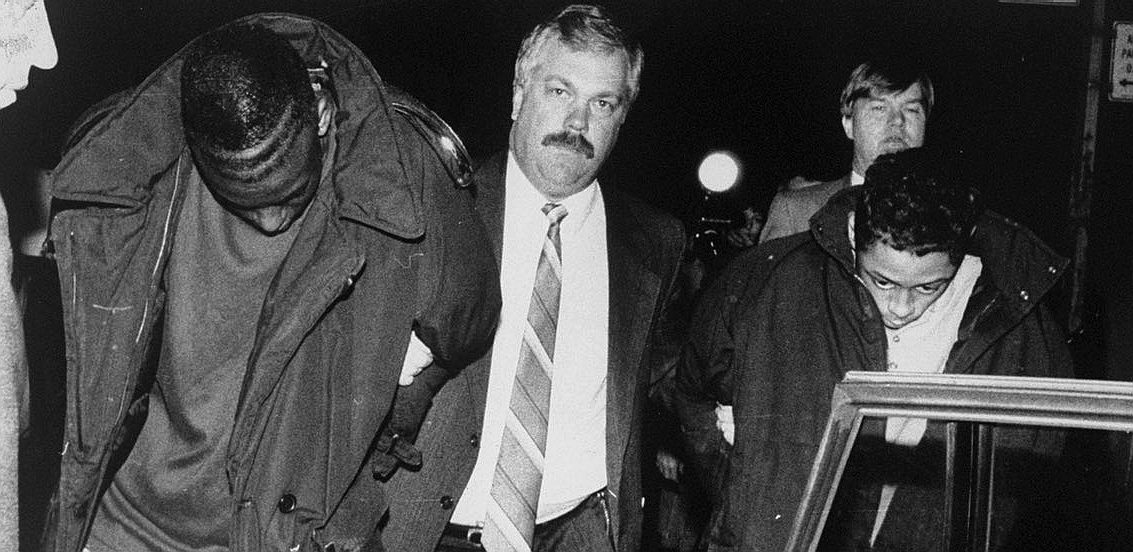
NYPD -
Yusef Salaam, left, is led away by a detective after being arrested in Central Park for allegedly attacking Trisha
Meili. Origonal photograph: New York Daily News Archive/NY Daily News via Getty Images.
‘He’s still the same person’
In 2002, after Salaam had served seven years in prison, Matias Reyes, a violent serial rapist and murderer already serving life inside, came forward and confessed to the Central Park
rape. He stated that he had acted by himself. A re-examination of
DNA evidence proved it was his semen alone found on Meili’s body, and just before Christmas that year, the convictions against each member of the Central Park Five were vacated by New York’s supreme court.
By this point, Trump had gotten his wish: the death penalty had been reinstated in New York since 1995, at great cost to the state. It was subsequently abolished in 2007, without a single execution carried out.
Following a 14-year court battle, the Central Park Five settled a civil case with the city for
$41m in 2014. But far from offering an apology for his conduct in 1989, Trump was furious.
In an opinion piece for the New York Daily News, he described the case as the
“heist of the century”.
“Settling doesn’t mean innocence, but it indicates incompetence on several levels,” Trump wrote, alluding to how police and prosecutors initially involved in the case have long maintained the five boys were involved in the rape, even after the convictions were thrown out.
D’Antonio, the biographer, met with Trump shortly after the settlement was announced. The
billionaire was once again considering a shot at the presidency and would, this time, actually run.
Trump was asked if he worried that his publicly confrontational style would affect his political prospects. He retorted instantly with a reference to the Central Park Five.
“I think it will help me,” he said. “I think people are tired of politically correct. I just attacked the Central Park Five settlement. Who’s going to do that?”
The biographer was shocked by what he heard. “His insensitivity and inability to adjust to reality is sometimes shocking,” D’Antonio said of Trump. “But I don’t think that he is necessarily interested in reality as others experience it or as it’s determined by the courts.
“There have been few cases of injustice that are as clear and profound as this one is, but he’s not able to consider that.”
Salaam, who said he had been scarred for life by his experiences in prison, also felt insulted. But it was the announcement last June that Trump had finally decided to run for president that was, in a way, more alarming.
“To see that he has not changed his position of being a hateful person, to see that he has not changed his position of inciting people, to see that he’s still the same person and in many ways he has perfected his sense of being that number-one inciter, you know, I was scared,” Salaam said.
He was unsurprised that Trump currently leads polling averages by nearly 20 points in South Carolina, a state that votes for the Republican nomination on Saturday and where only last year the Confederate flag was withdrawn from the state house grounds. (A survey released this week suggests 70% of Trump’s supporters in south Carolina believe that decision was wrong and 38% of his supporters wish the south had won the
civil
war.)
“I thought for a moment: What would this country look like with Donald Trump as being a president? That’s a scary thing,” Salaam said. “That’s a very scary thing.”
By Oliver Laughland
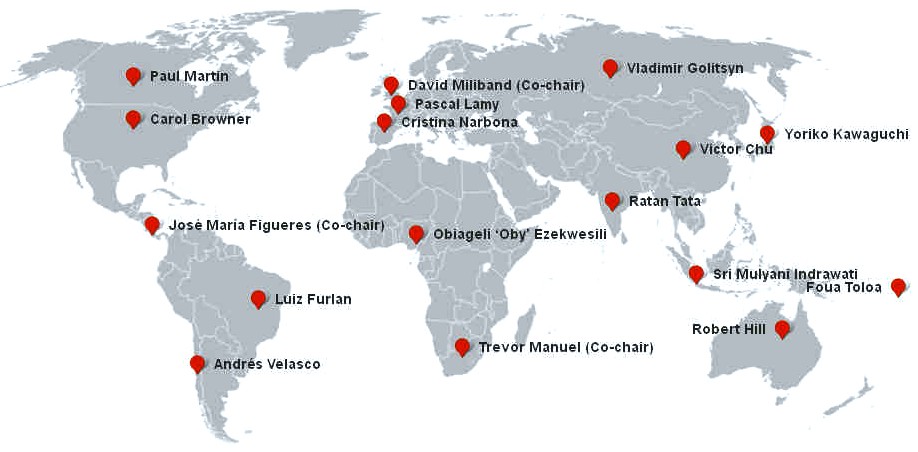
The National Ocean Policy ("NOP") strives to be the one unifying law to govern the resources of our oceans and Great Lakes in the United States. The NOP was enacted by an Executive Order of President Barack Obama on July 19, 2010. The National Ocean Policy is said to be: One Small Step for National Waters, but Will It Be the Giant Leap Needed for Our Blue Planet?"
The above is a map of the world showing the locations of the Global Ocean
Commissioners, with Carol
Browner representing the USA.
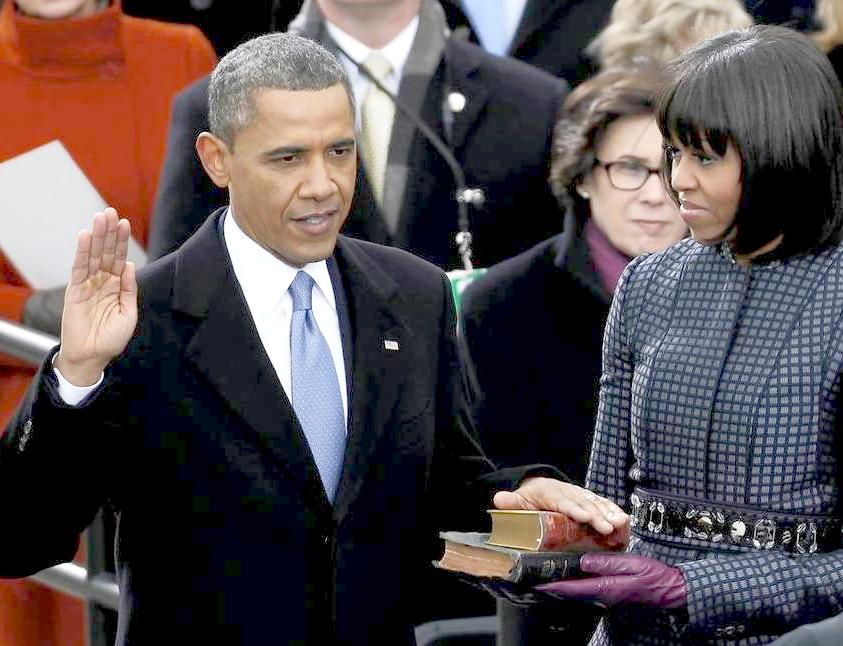
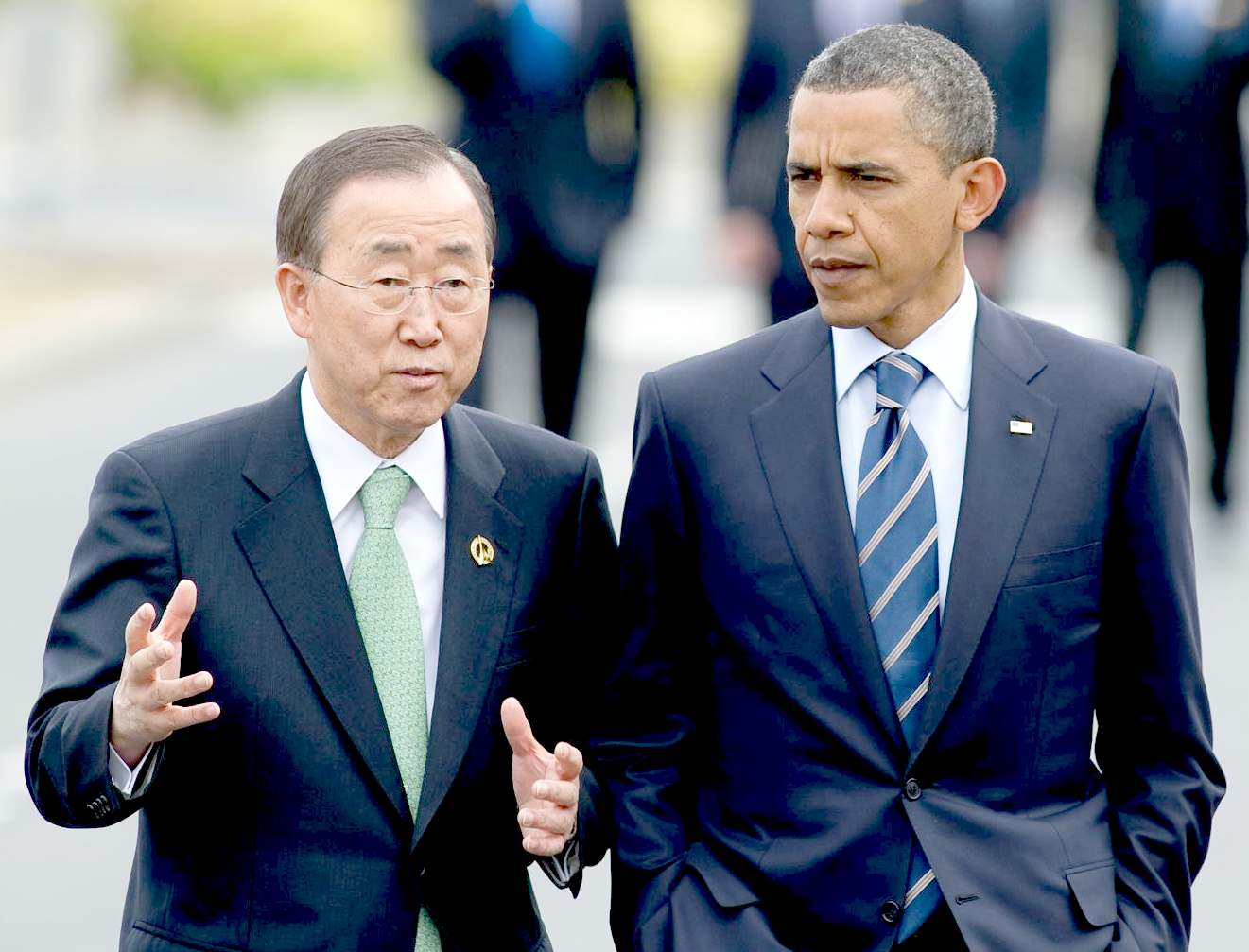
U.S. Supreme Court Chief Justice John Roberts
administered the oath of office to U.S. President Barack Obama as first lady Michelle Obama and daughters Malia and Sasha look on during ceremonies on the West front of the U.S Capitol.
Barack H. Obama is the 44th President of the
United
States.
According to the Whitehouse website his story is the American story - values from the heartland, a middle-class upbringing in a strong family, hard work and education as the means of getting ahead, and the conviction that a life so blessed should be lived in service to others.
He was elected the 44th President of the United States on November 4, 2008, and sworn in on January 20, 2009. He and his wife, Michelle, are the proud parents of two daughters, Malia, 14, and Sasha, 11.

LINKS
& REFERENCE
https://www.donaldjtrump.com/
http://www.telegraph.co.uk/news/0/donald-trumps-presidential-inauguration/
https://www.theguardian.com/us-news/2016/feb/17/central-park-five-donald-trump-jogger-rape-case-new-york
http://twitter.com/oliverlaughland
http://www.japantimes.co.jp/tag/donald-trump/
https://www.thesun.co.uk/news/2422519/donald-trump-ridiculed-on-twitter-over-embarrassing-spelling-mistake-in-comment-on-stolen-us-drone/
http://edition.cnn.com/2017/01/13/politics/us-tillerson-china-reaction/
https://en.wikipedia.org/wiki/Donald_Trump
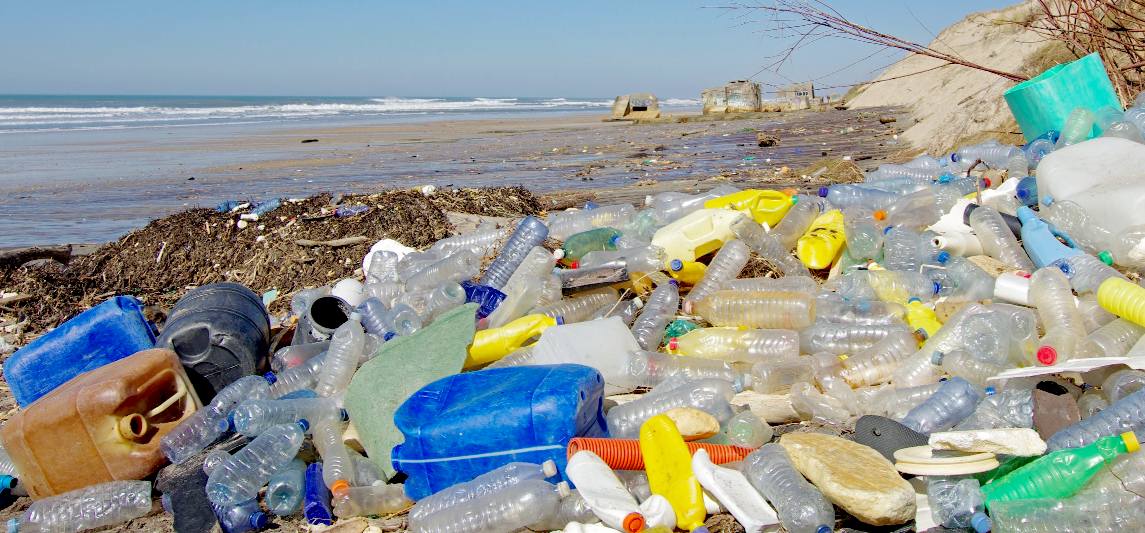
ACID
OCEANS - ARCTIC
- ATLANTIC - BALTIC
- BERING
- CARIBBEAN - CORAL - EAST
CHINA SEA - ENGLISH CH
GULF
MEXICO
- GOC - INDIAN
- MEDITERRANEAN -
NORTH SEA - PACIFIC
- PERSIAN GULF - SEA
JAPAN - STH
CHINA
PLANKTON
- PLASTIC
- PLASTIC
OCEANS - UNCLOS
- UNEP
- WWF
|













